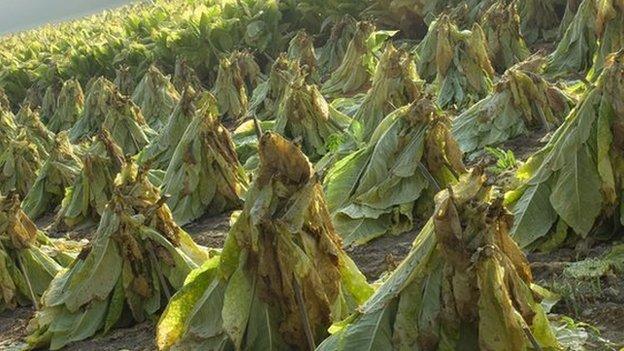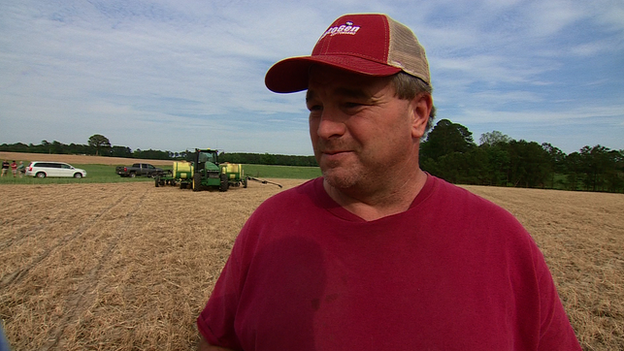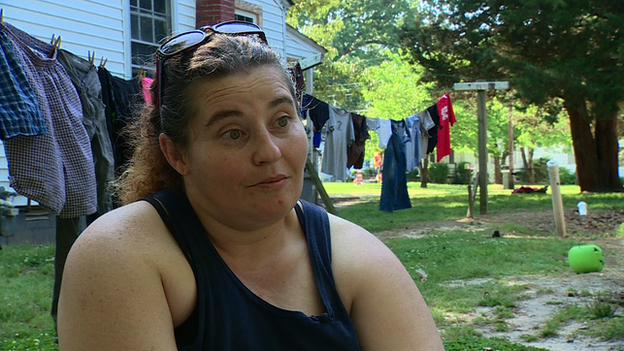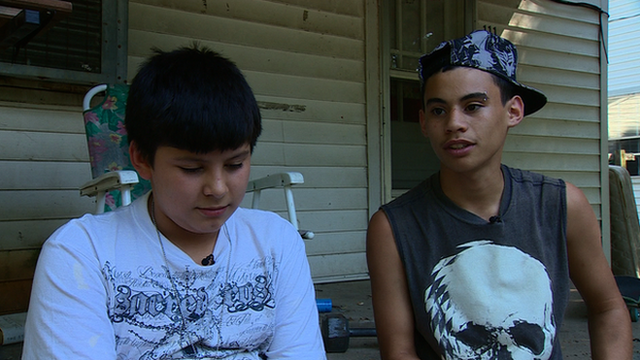US tobacco child labour criticised in report
- Published
The BBC's Aleem Maqbool spoke to two North Carolina families who farm tobacco, including two boys under 15
Children have been farming US tobacco fields for generations. But a new report from Human Rights Watch says the practice is dangerous and in need of reform.
It may be later than usual because of the harsh winter, but just as they have done for generations, people are planting tobacco across the vast coastal plains of North Carolina.
The crop put this state on the economic map, but methods used to farm tobacco here have now drawn the gaze of an international human rights group.
"Usually we would wake up around four or five in the morning and get to the farm around six," says Fernando Rodriguez.
"I would spend the whole day going up and down the rows of tobacco, topping the plants, cutting the flowers, collecting the leaf and all."
Fernando is 13 years old.

Ten major companies use US tobacco to make cigarettes
"Most people kept trash bags on them, with holes for their arms and head, to keep chemicals off their clothing," he says.
"On the first day when I was working [the chemicals] got on my face a lot and I didn't know until I got home later that day my face was burning."
For three months last summer, Fernando and his older brother Brandon Jayubo, each worked up to 72 hours a week harvesting tobacco. Then 12 and 14 years old, they earned $500-$600 (£297-356) per week.
Surprising as it may be, that does not currently violate American labour laws.
After failing to push through a change in US legislation two years ago, rights groups are now hoping cigarette companies, and even smokers themselves, will decide to take an ethical stand when it comes to children and tobacco farming.
"I saw kids walking into fields of tobacco plants over their heads, where the tobacco leaves were wet with dew," says Margaret Wurth, a researcher at Human Rights Watch. The group has prepared a new report documenting the problems for children in this industry.
"The kids were absorbing nicotine through their skin and many of the children we interviewed reported symptoms consistent with acute nicotine poisoning: nausea, vomiting, headaches, dizziness, light-headedness," she says.
Human Rights Watch also reports children working near heavy machinery, using dangerous tools, and climbing into the rafters of barns several storeys high without protection.
The group says in many ways, America is flouting International Labour Organisation conventions.

Joey Scott says children working on farms is a part of US tradition
Washington rules do say that the work children do on farms must happen outside of school hours, but don't place a limit on how many hours they can work.
Campaigners say that falls far short of what is needed. They want to outlaw children from working the fields at all.
"Countries like Brazil and India prohibit children under 18 from doing many tasks involved in tobacco farming," says Wurth.
"They have laws and regulations to do more to protect kids in tobacco farming than we have in the US."
Joey Scott is a farmer whose family has grown tobacco on the same North Carolina land for eight generations.
"I was raised as a child on a tobacco farm. My parents felt it was safe enough for me to be here," he says. "I felt it was safe enough for my children."
Scott, who does not employ anyone under the age of 18, accepts the possibility that other farmers may be exploiting young workers. Still, he says that having children work the fields is part of the region's heritage.
"I attained a lot of my values through the work I did alongside my parents and grandparents, by being in the fields, understanding the everyday struggles," says Scott.
"What they get from working here on the farm is to understand the importance of a dollar, how hard it is to make a dollar, and how to spend that dollar they make wisely."
It was a point echoed by Jessica Rodriguez, mother of Brandon and Fernando, the boys who worked on the farm during their summer break. She says when the boys are not at school, she would rather they work than hanging around in the streets or with other boys, getting into trouble.
Like child labour stories all over the world though, Rodriguez acknowledged that the main reason her sons worked was the harsh economic climate.

Jessica Rodriguez is glad her sons can work the farms
"We had to do what we had to do to keep the roof over our heads and food in our stomachs and the lights on, water on, the important stuff," she says.
Rodriguez admits that it upset her when her youngest son complained of harm from chemical pesticides. She insists the children wanted to help out.
Human Rights Watch says all of the tobacco companies they contacted expressed concern about working conditions for children, and all of them have a variety of previously established policies to address the problem.
Campaigners want more explicit language polices that clearly ban child labour. They also hope that tobacco companies will invest in local communities so that families have alternative options and do not feel compelled to put their children at risk.
Until then, the tobacco keeps growing, and with it, the demand for farm workers of all ages.
- Published14 May 2014
